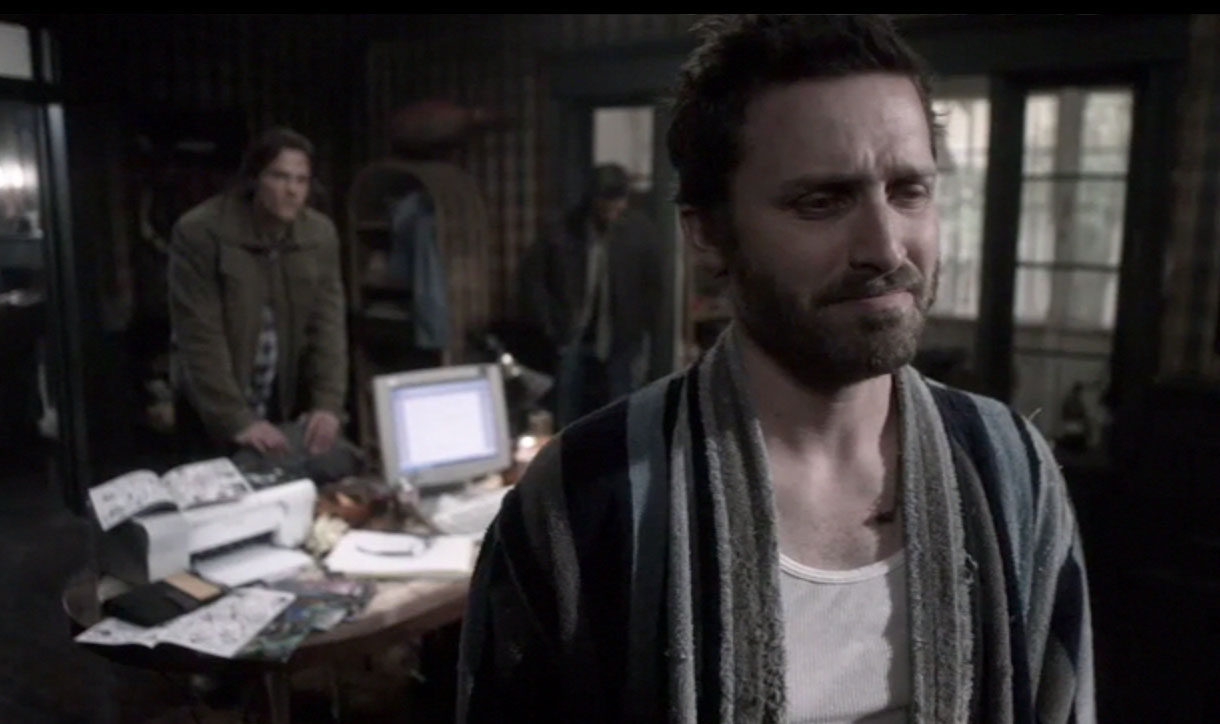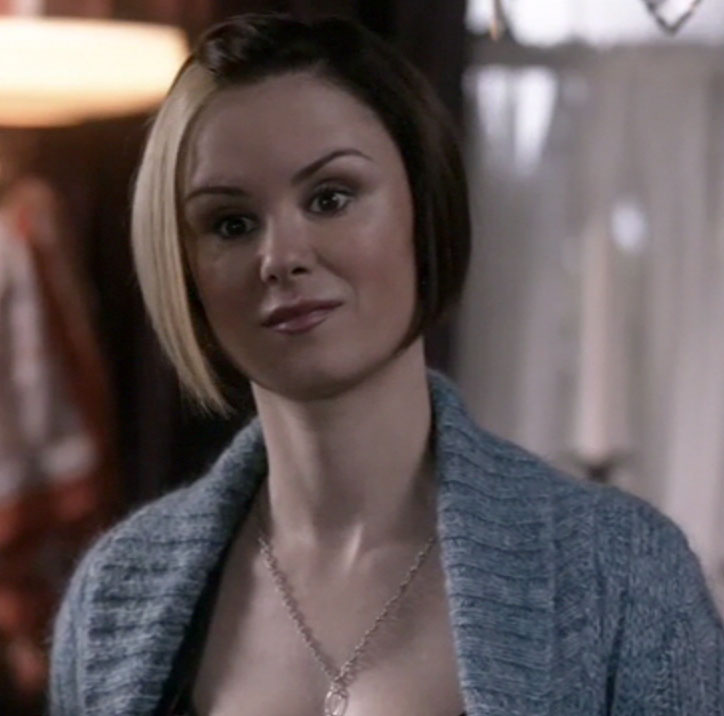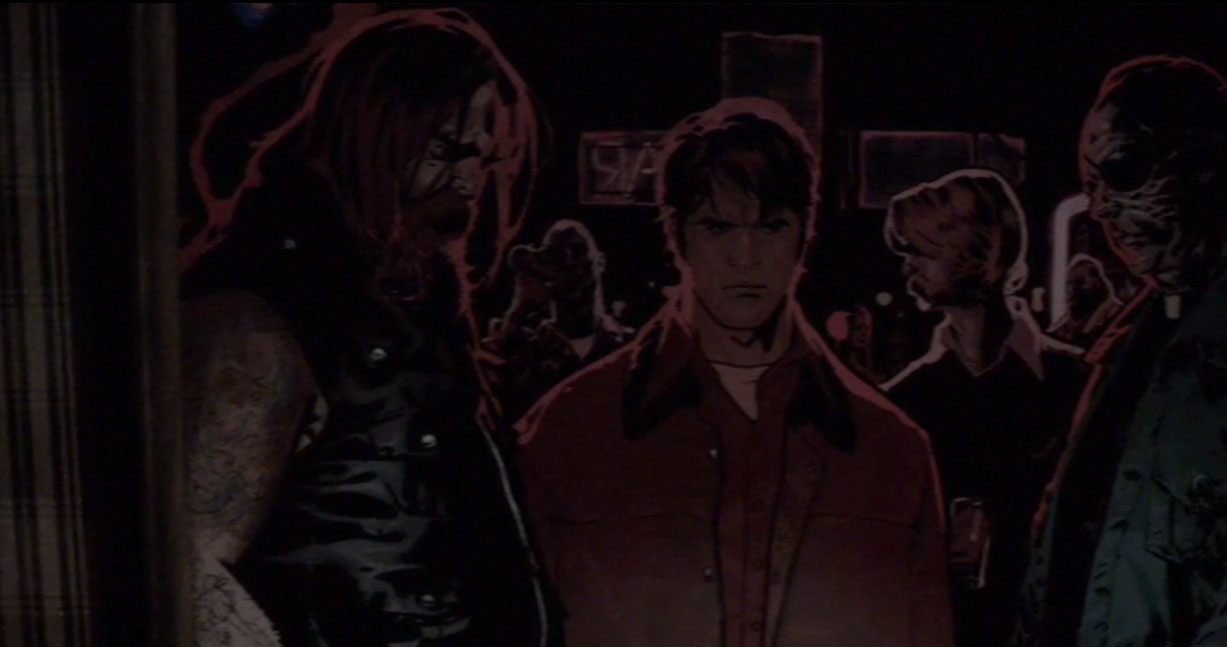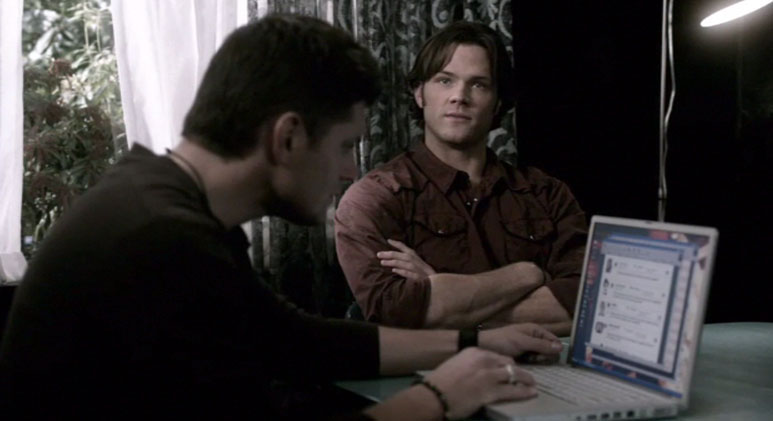1. Introduction
[1.1] Supernatural is an amalgamation of stories built upon stories, in which the creators use forms of myth and folklore to create monsters of legend—as do the characters of Sam and Dean Winchester themselves, within the show. The information they need to defeat a certain creature is rarely set in stone, instead requiring research into stories and myths that have developed in numerous cultures. As truth and fiction continue to mix in the Winchesters' lives, sometimes they are faced with the burden of tales literally come to life, such as in 1.17 "Hell House," when a tulpa is created because millions of people believe in it.
[1.2] One of the most poignant and fascinating versions of this idea can be found in Jorge Luis Borges's short story "Tlön, Uqbar, and Orbis Tertius" (1962). In the tale, the main character comes across a body of information about an imaginary planet, describing the customs and culture of its people so specifically that it seems too detailed to be real, or at least too grand a project to be created by one person. Eventually it is revealed that a large group of people created this idea initially but it was sustained over generations of followers and, in the end, Tlön becomes so popular and admired that our world begins to resemble the fictional creation.
[1.3] These patterns become useful for what they reveal about fandom, as the communal and transformative nature of folklore allows works to go through similar changes and versions, and the literal fans of Supernatural also draw from the episodes and characters to create new opinions, hypotheses, fan works, and more. But fans, especially those who focus on creating transformative works, have had little reason to believe that their creations would ever reflect back onto the canon of the show—at least, until 4.18 "The Monster at the End of This Book," which departed from other instances of reference to fandom by directly acknowledging it. It also values the influence that fans, both real fans and their avatars within the story, might have on the greater narrative.
[1.4] Tlön was created not through a traditional team of static authors, but through communities of people separated by distance and time, continuing to add onto and shift the ideas of others. Supernatural has shown its fans that their Tlön may be transforming The Powers That Be's Earth, which has many implications not only for the communication between fans and creators, but also for the nature of creators themselves. Though the effect that fans have is still minor, I suggest that in the long run Supernatural's fans have gained a measure of power that will help them feel more included in the general fan base, communicate better with the creators, and, possibly, force the creators to address critical and difficult problems in the show—all through transformative fan works.
2. Acting out fiction: "Screw you, Simpatico, we lived it"
[2.1] In "The Monster at the End of This Book," fandom and its interweaving stories are explicitly drawn into the narrative and made an integral part. As the Winchesters discover the existence of a book series depicting their lives, they are forced to confront three forms of audiences that can all be compared to fans. Chuck, the author of the books, believes that he writes and creates merely through his imagination when he is instead being used as a vessel for divine prophecy, taking his stories from the lives of Sam and Dean (figure 1). His publisher is equally invested in the production of the books, but also in the story and characters, displaying herself as both a fan and an authority. And of course there are the fans of the books themselves, who closely resemble the real fans of Supernatural.

Figure 1. Writer Chuck Shirley (Rob Benedict) is shocked to see his "characters" Sam (Jared Padalecki) and Dean (Jensen Ackles) come to life (4.18 "The Monster at the End of This Book," 2009). [View larger image.]
[2.2] To top it all off, Sam and Dean have to represent themselves as fans to the publisher and are mistaken for fans by Chuck. They are forced to confront the idea that someone else may have some control over their lives. The show has covered the issues of free will and destiny in many different ways throughout the seasons, and the experiences cause Sam to believe that he has a set path, while Dean rages as hard as he can against fate. Once again, the battle comes to a head in "The Monster at the End of This Book," when Sam and Dean are confronted by a record of what may lie in their future. They not only fulfill their destinies exactly as Chuck wrote them, but their knowledge of what is ahead perpetuates some of the predetermined events. Without Dean's intention to park his car in a neighborhood and leave it there, he would not have been hit by a minivan and plastered with the pink Band-Aids that Chuck's writing described. Sam's knowledge of Lilith's arrival causes him to plan ahead and pretend to strike a deal with her.
[2.3] Once again, the in-text version of fandom—Chuck and his books, which ostensibly tell Sam and Dean's story instead of dictating it—instead helps to change and determine the outcome of Sam and Dean's "real life." The discovery that Chuck is a prophet also carries significance, giving him a higher role as a conduit for the Word. Here original works are respected on a level equal to those that may seem transformative; Chuck also shows that transformation of narratives is literally as old as the Bible. And finally, the episode again raises the question of a higher authority, a literal author of events, bringing us back to our own eternal questions of who rules our lives—Supernatural may attempt to answer it for Sam and Dean, but the answer is rarely simple and can still make us question ourselves.
[2.4] If the fictional versions of fandom are able to change real life in the theoretical ways illustrated through the various levels of narrative in the show, perhaps the real Supernatural fandom has also affected the creation of the original source material. This can also be seen in "The Monster at the End of This Book," and, most significantly, it engages not only with direct criticism by viewers but also with fan criticism in the form of fan works, which are usually not acknowledged or taken to be valid.
3. The effects of fandom on source texts
[3.1] As long as popular culture is fueled by the need to be popular, especially in a world of commercialized entertainment, audiences will have some measure of power over creators of entertainment. For Supernatural, there have been a number of movements and complaints from the fans that have affected editorial decisions in the show. Most notable has been criticism regarding some female characters in Supernatural, prompting their removal from the show. Other critiques have had little effect, such as repeated outcries by fans over racist, sexist, and homophobic overtones in the show. Because of these failures to acknowledge criticism, many fans believe that they are only able to effect change where Eric Kripke and the other creators were previously inclined to the suggested alterations.
[3.2] Fans affecting the canon through direct criticism and discussion is thus accepted as a viable form of communication with creators, despite varying effects. More remarkable is the idea that not only the opinions of fans carry influence, but also their creations, particularly in the case of transformative works.
[3.3] In the past, the only effects have been jokes or quips that are considered "fan service," such as people mistaking the brother for a couple, or a character in 2.18 "Hollywood Babylon" who mentions the show Gilmore Girls, which actor Jared Padalecki acted in for a number of years. Writer Sera Gamble has also joked about "the epic love story of Sam and Dean" (Borsellino 2006); various actors have mentioned that they enjoy reading fan reactions on the Internet; and actor Misha Collins, who plays the angel Castiel beginning in season 4, has even mentioned reading fan fiction.
[3.4] But none of these are significant on an editorial level, and no one particularly expected fandom to be directly acknowledged in the show because there was no precedent for it in Supernatural or television itself. Once again, "The Monster at the End of this Book" shattered the barrier between fandom and text. When Sam and Dean encounter Web sites about the Supernatural books, they discover online forums, fan reactions, and even fan works that mention Sam/Dean slash. Such direct references go further than fan service; these fans are expected to be an integral part of the entire experience, sending a message to the real audience of the television series. The episode is also littered with references to the real-life creators and Supernatural works: the publisher is named Sera after writer Sera Gamble (figure 2), Chuck's pen name "Carver Edlund" is a reference to writer Ben Edlund, the diner in which Dean and Sam eat is called Kripke's Hollow after creator Eric Kripke, and among the posters on Chuck's walls is a cover from an issue of the comic tie-in Supernatural: Origins (Johnson and Dow Smith 2008), to name a few (figure 3). Because the characters of Sera and Chuck are in positions that are both administrative and fannish within the episode, the fact that they are named after real writers of Supernatural makes a connection between the two, blurring the line between creator and fan.

Figure 2. Character Sera Siege (Keegan Connor Tracy), publisher of the Supernatural series and self-professed fan (4.18 "The Monster at the End of This Book," 2009). [View larger image.]

Figure 3. The cover of Supernatural: Origins #3, which shows up as a poster on Chuck's wall (4.18 "The Monster at the End of This Book," 2009). [View larger image.]
4. The implications of influence
[4.1] Many of the long-running assumptions about television and fandom can be refuted by these analyses. For example, researchers assume that fans buy into the capitalist system of commercialized entertainment and cannot escape from it, acting purely as consumers with buying power. Fandom and the influence fandom reflects back onto the source help to disrupt the one-way flow of information, giving fans a greater stake and making them more equal participants in the larger conversation between mediums and audiences. Given the competitive nature of the entertainment industry, ceding more power to those who don't necessarily have a way in may have implications for the accessibility of entertainment production or working toward social equality in the entertainment industry. This becomes problematic when the positions played by fans are viewed not as part of a mutual conversation, but as free fan labor for the industries. However, this manipulation by the creators has always been seen as unlikely for Supernatural, given the controversial nature of the themes in its fan works.
[4.2] If the idea of fan labor as power is controversial, equally so is the increase of fan visibility that both caused and results from such interactions between fans and source texts. It is clear, however, that no matter what fans do, the social nature of the Internet and efforts to make fandom accessible to anyone do open it up to the public eye, whether specific fans participate in the opening or not. For those who see increased visibility as inevitable, it is preferable to have positive reports published. Supernatural fandom is a striking example of both sides of the argument, given the popularity of Wincest and real-person fiction narratives that may not be accepted even by other slash fans. The specific reference to Wincest in 4.18 (figure 4) caused pain to fans who did not want their already controversial practices to be further exposed. On the other hand, by posing the reference as a light joke, the editorial team may have been sending a message to such fans that they are just as welcome as others who love Supernatural. After the episode, many fans pointed out that the joke was not particularly offensive to fans and did not belabor the point; when Dean reacts to the idea of slash by saying "That is just sick," many fans read it as the inevitable response for the character.

Figure 4. "What's a slash fan?" Dean and Sam discover their popularity on the Internet (4.18 "The Monster at the End of This Book," 2009). [View larger image.]
[4.3] Furthermore, engaging with the source texts means that the creators of the canon are not only acknowledging and communicating with these fans, but in a similar way. This is particularly significant given the qualities typically associated with slash fandom, populated largely by women and by a minority of queer men: slash fandom is less given to direct criticism than straight male fandoms, and its responses tend to be through fiction. The creators of Supernatural have demonstrated a willingness to appreciate and participate in the transformative culture, even when it may be risky or unfamiliar to their other audience demographics.
[4.4] But what does this mean for fannish opinions that are still unacknowledged by the creators? Criticism of Supernatural's social dynamics has had little effect, and many fans feel alienated by sexist, racist, and homophobic elements in the show. And although most of these arguments have taken the form of direct criticism, unlike complaints about specific characters, they do not provide easy solutions for the creators of the show because fans rightfully expect that to be the responsibility of The Powers That Be. However, some of the best-known forms of critique are transformative instead of direct—undoubtedly the most famous is the vid "Women's Work" by Sisabet and Luminosity (http://www.viddler.com/explore/Luminosity/videos/2/), which combines images of violence against women in the show to reveal its sexism. The acknowledgment of Wincest and transformative works may give more power to those who use fan works for their critiques. Although the burden of addressing these issues shouldn't be placed on the fans, it may been seen as a slightly more hopeful indicator.
[4.5] In any case, the effects of these new developments in shows like Supernatural have important consequences for the relationship between fans and creators, and likely positive ones. Fandom has changed drastically thanks to the Internet, including the attention drawn to fandom through other channels, the increase of global communication, the possibilities of increasing access to different types of people and fans, and so on. The relationships between stories and life, fans and creators, fan works and source material, and other complex dualities may prove just as important as any of the other factors, helping fans to improve their relationships with the canons that they love so much.